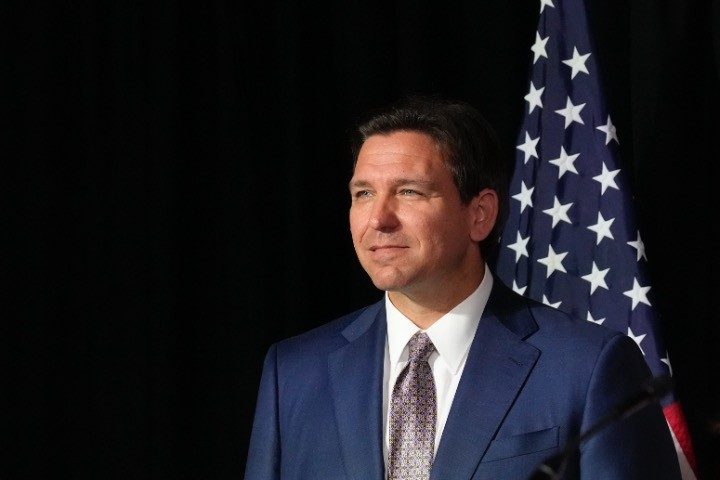
Florida Gov. Ron DeSantis’ new set of legislative proposals would go far in making Florida a sanctuary — not for illegal aliens, but for citizens.
In a plan unveiled in Jacksonville, the Republican governor blasted Joe Biden’s “reckless federal open border policies” and presented a list of proposed policies that would increase human smuggling penalties, impose mandatory E-Verify, and ban counties from giving driver’s licenses to illegal aliens.
“With this legislation, Florida is continuing to crack down on the smuggling of illegal aliens, stopping municipalities from issuing ID cards to people here illegally, and ensuring that employers are hiring American citizens or those here legally,” said DeSantis. “Florida is a law and order state, and we won’t turn a blind eye to the dangers of Biden’s Border Crisis.”
Under DeSantis’ plan, which he is calling on the Florida Legislature to adopt in the upcoming legislative session, it would be a third-degree felony to knowingly conceal, harbor or transport an illegal alien. If the alien is a minor, then the act of smuggling would be bumped up to a second-degree felony.
One of the major aspects of DeSantis’ proposal likely to face hurdles is his call for mandatory E-Verify, under which all Florida employers would be required to prove that their employees are legally authorized to work in the United States.
DeSantis fought for E-Verify in 2020, but the Republican-dominated Legislature bowed to lobbying by the agricultural and tourism industries. Ultimately, the Legislature passed a watered-down version of the bill that only mandates E-Verify for the public sector. DeSantis signed it into law, but now wants to go back to implement the service for private employers.
In addition, DeSantis’ E-Verify proposal would make it a felony for an illegal alien to use a fake Social Security number, visa, or green card for the purpose of getting a job. Employers who break the E-Verify requirement twice in a two-year period would be subject to loss of their business license.
The DeSantis plan would not only ban the issuance of driver’s licenses in Florida counties, it would invalidate the driver’s licenses of illegal aliens issued by other states.
The proposal would also tackle the issue of elections, requiring individuals registering to vote to affirm that they are both U.S. citizens and Florida residents.
Moreover, the plan would ban illegal aliens from practicing law in Florida, and would require hospitals to gather data and submit reports to state authorities regarding the impact illegal aliens are having on the hospital system and how much they are costing taxpayers.
Mark Glass, Commissioner of the Florida Department of Law Enforcement, praised the plan:
Human smuggling, drug trafficking, and a host of other criminal activities are steadily spilling across the Southern Border and into our state, as bad actors seek to exploit the hard-earned wealth and hard-won freedoms of our citizens for criminal gain. In tandem with our continued vigilance and cooperation with our law enforcement partners across the state, the initiatives championed today by Governor DeSantis will help to keep Floridians safer than ever, protecting our citizens from malefactors who are illegally in our state and removing them from our communities altogether.
“I think we’re going to be able to do more in the next couple of months, when the Legislature reconvenes, than anyone’s been able to do in the modern history of Florida,” DeSantis said of his proposal.
One aspect of his plan which may elicit pushback from some of his allies is a proposed prohibition on illegal aliens from getting in-state tuition rates or out-of-state tuition waivers.
This would mean repealing the current policy allowing in-state tuition for illegal aliens, which was originally sponsored by DeSantis’ own lieutenant governor, Jeanette Nuñez, back when she was a state representative. It was signed into law by then-Gov. Rick Scott, now a U.S. senator.
When reporters asked Scott about DeSantis’ proposal, the senator defended having signed the tuition bill into law:
When I think about that bill I think about little two, or five year-old girls. They were brought here, they didn’t come here on their own volition….
They lived in this country. They went to school. Maybe they were an honor roll student, and maybe they tried to get Bright Futures with the belief that they could go to one of our great universities in the state. So for them we cannot put this thing out of reach for them to live their dream. It was a bill I was proud to sign, I believe in it. I believe these individuals ought to have the opportunity to live the dream of this country. It’s a bill I would sign again today.
If DeSantis’ proposals were to make it into law, they would constitute one of the most aggressive state efforts in the country to combat illegal immigration.
The question is whether the plan will make it through the wall of opposition sure to be erected by the Donor Class, which profits from the cheap labor of illegal aliens.
It’s a legislative battle that will certainly serve as a litmus test to determine which legislators truly stand for the people, and which serve the special interests.
To learn more about the immigration crisis and what can be done about it, click here.


